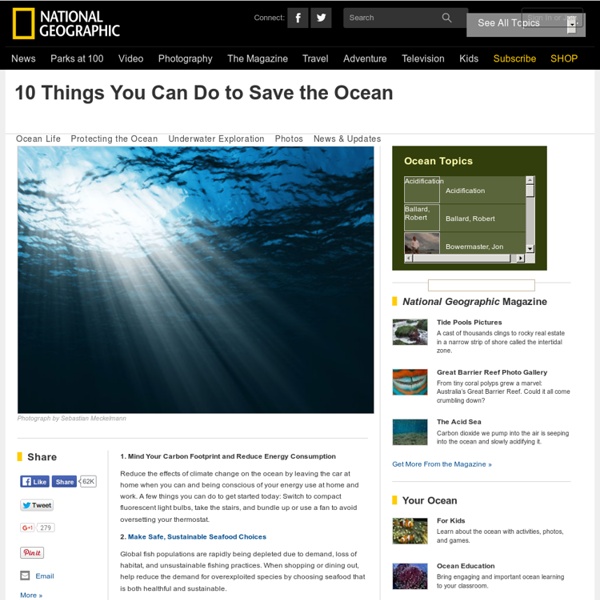Saving our Planet
Oceans - United Nations Sustainable Development
10 Ways to Help Save the Ocean
Meghan MacGillivray, Sarah Bedolfe, and Sarah Wilson | October 08 2012 The ocean is massive, and a lot of the problems facing it are too. It can feel overwhelming to look at these issues. Here are a few things that you and I can do, on an individual level, to help make change. Eat Sustainable Seafood: Overfishing is a global problem, and many common fishing and farming methods result in major habitat damage or large amounts of bycatch – other species are caught unintentionally and are often thrown back dead.
Campaign | Oceana
Pollution — from oil spills, coal plants and other sources — can negatively impact the health of the oceans and both the creatures and people who depend on them. Oceana is working to stop ocean pollution from all of these sources in order to protect marine biodiversity and abundance. The vast oceans act as a tremendous carbon sink, absorbing about one-third of carbon dioxide emissions. Acidification is already leading to the degradation of coral reef habitats and negatively impacting some commercially important fisheries, like shellfish. The ever-increasing amount of livestock, raised to supply the skyrocketing demand for meat, is also contributing to climate change. Offshore drilling increases the risk of toxic exposure from oil contamination to wildlife and coastal communities, and contributes to economic losses and climate change.
Let's start...
Two guys from Australia invented a trash bin for the ocean
Pools have filters so why not the ocean? It’s a question many ocean lovers have asked (myself included) but two Australians pondered this and took it further by inventing a filter for harbors around the world. Andrew Turton and Pete Ceglinski, two avid surfers, quit their jobs to create a “seabin” that collects trash, oil, fuel and detergents. The fact that the “seabin” collects oil and detergents succeeds in eliminating all the things the world doesn’t want in the sea and which are extremely hard to filter out once in the ocean. The two inventors also started the Seabin Project with two objectives in mind. To make this story even more epic check out 0:20 where Pete says he “was a product designer in another life and it was [his] job to make plastic products.” This insight and mission to protect the oceans shares is incredible. Imagine if every harbor, boat owner, and floating buoy had a “seabin” to collect floating trash and oil pollutants.
OVERFISHING
• Stop the Problem of Ocean Acidification Global warming has been a hot topic in the ocean world, and it is because of ocean acidification, known as 'the other global warming problem.' As the acidity of the oceans increases, it will have devastating impacts on marine life, including plankton, corals and shellfish, and the animals that eat them. But you can do something about this problem right now - reduce global warming by taking simple steps that will likely save money in the long run - drive less, walk more, use less electricity and water - you know the drill.
Learn more and... ENJOY!
Great Barrier Reef coral bleaching at 95 per cent in northern section, aerial survey reveals - 28/03/2016
Great Barrier Reef coral bleaching at 95 per cent in northern section, aerial survey reveals Australian Broadcasting Corporation Broadcast: 28/03/2016 Reporter: Peter McCutcheon An aerial survey of the northern Great Barrier Reef has shown that 95 per cent of the northern reefs are now severely bleached — far worse than previously thought. Transcript LEIGH SALES, PRESENTER: Exclusive footage of the Great Barrier Reef shows what could be the most severe and extensive coral bleaching on record. A leading coral researcher has just returned from a four-day aerial survey of reefs off Australia's far north coast, and of the 520 reefs his team flew over, all but four were damaged. The extreme bleaching event is likely to kill some of the world's most pristine coral, as Peter McCutcheon reports. TERRY HUGHES, JAMES COOK UNIVERSITY: This will change the Great Barrier Reef forever. GREG HUNT, ENVIRONMENT MINISTER (March 20): There's good and bad news. JUSTIN MARSHALL, UNI. NEAL CANTIN, AUST.
101+ Ways to Make a Difference ~ Solutions that Protect the Ocean
» Also recommended: Tips from Scientists to Help Polar Bears @ Polar Bears International Try to keep things in perspective. Be mindful of the big problems, but focus on solving them through the things we can all do everyday to help reduce them. Develop a positive outlook: First, accept that you are only able to control your actions and responses to changing conditions around you.Take responsibility for your actions in all things. What you can do to protect the ocean Do you know what the number one thing you can do is to protect the ocean? Patronize restaurants that recognize the need to consume seafood sustainably. Things you can do inside the home (yes these also protect ocean life) If you own your home, install water-saving toilets. Things you can do outside (yes these also protect ocean life) Food for thought Take a reusable bag grocery shopping, to the drugstore etc. Make it a lifestyle Learn about conservation issues in your community or state. "Save Our Seas (SOS)!" . is all about. .



